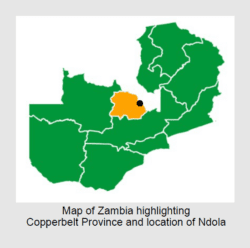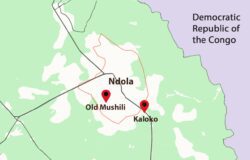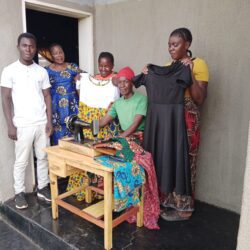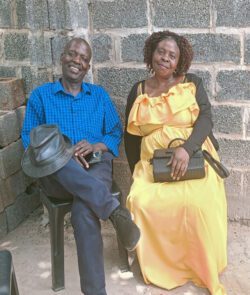

Ubuyantashi is a Bemba word meaning “sustainability, development or moving forward”. Our new project with Zambia partner, Eliashib Restoration Organisation (Eliashib), will equip 40 trainees with vocational skills in Catering, Tailoring or Agriculture.
 Project backdrop
Project backdrop Zambia ranks among the countries with the highest levels of poverty and inequality globally. Poverty reached 60% of the population in 2022, up from 54.4% in 2015, worsened by limited job creation and declining labour earnings. Zambia is one of the world’s youngest countries by median age. 80% of the population is aged below 35 years (Zambia Statistics Agency 2022) and youths face increasing challenges to find meaningful, lucrative and sustainable employment. A comprehensive assessment undertaken by our partner, Eliashib, showed that lack of skills training greatly impacts the ability of young people in the Ndola area to access jobs, health care, and other social services. These challenges are felt most keenly by young women.

Map of Ndola showing the participating project communities
The Ubuyantashi project aims to develop the lives of trainees and move them from unemployment or underemployment into gainful and fulfilling work. In turn this will develop confidence, social standing and security for project participants and their dependents. Consultation with members of the Old Mushili and Kaloko communities of Ndola (Zambia’s third largest city) revealed which trades they felt would yield the best results and had the greatest potential for growth. Based on the finding of this research, the project will target two distinct groups, undertaking different kinds of training in the most relevant trades:
• Old Mushili community: Young and/or single mothers aged between 18 and 24 who are head of their household or from female headed households will undertake vocational training in either Tailoring or Catering. At the end of this period trainees will receive a TEVETA qualification, which will demonstrate to potential employers and customers that their work is of high quality and officially recognised.
• Kaloko: Training in General Agriculture will take place in the Kaloko community.

Tailoring trainees from our project in 2024
Tailoring trainees will learn advanced sewing techniques, design, patternmaking, and use of modern sewing machines. They will complete the course with an extensive knowledge base including, adopting new techniques and technologies in garment construction, producing enhanced quality finished products, increasing their efficiency in production processes, the ability to access new markets and customer bases and developing branding and marketing strategies to attract more customers.
Catering trainees will graduate from the course with knowledge in modern culinary techniques and food safety standards, develop managerial and business skills for running catering businesses, how to identify quality and variety of food highly demanded on the market.
General Agriculture trainees will focus on the use of sustainable farming practices that are well-suited to the local climate and market demands. This will include organic farming, cultivation of high-value crops with health benefits such as pumpkin leaves, spinach, Kale and other vegetables, drought resistant crops such as sweet potatoes, cassava and crops that can be grown through-out the year such as egg plants. The curriculum will also include practices such as the use of organic fertilizer, vertical farming methods, container gardening, and efficient crop rotation techniques.
Trainees will take part in activities which will help to reinforce their learning, build real life experience and contribute positively to the local community. Tailoring students will partner with local schools to provide affordable school uniforms, and run community clothing drives where trainees can alter or repair donated clothes before distribution to those who otherwise can’t afford items. Catering students will offer cooking classes to teach healthy and affordable meal preparation. Agriculture students will organise farmers markets to sell produce they have grown, promoting fresh local produce.

Mr & Mrs Mumba: Graduates of the Class of 2016
Trainees will be equipped to achieve increased income, increased savings and investment capacity, access to employment and self-employment and improved nutrition for themselves and their families.
Projects like this can transform the life of the trainee quite fundamentally and create opportunities for self development beyond financial independence. Trainees develop the confidence to make their business plans a reality, and make vital connections to the local community.
Mr & Mrs Mumba, pictured left, graduated from our vocational training project with Eliashib in 2016. Two years later they registered their own business combining knitting and tailoring to make school uniforms, jerseys, dresses, medical coats and work suits. In 2024, Mr & Mrs Mumba returned to the Eliashib training centre to share their inspiring story with participants of our Transition to Work project, supporting new graduates as they begin to build their businesses.
Projects such as these would not be possible without you. If you would like to support our life-changing projects, please click here to give a one-off gift or set up a regular donation. Thank you.
April 2025